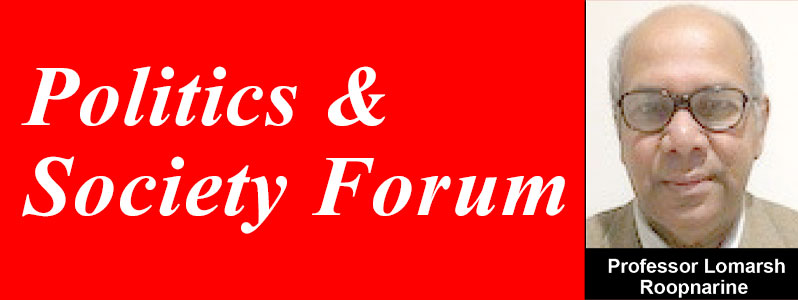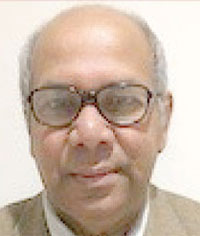BARBADIAN-BORN now Guyanese businessman, information, and technology specialist and non-fiction author, Wayne Westphal Barrow penned a rather interesting and informative book titled Guyana’s Election 2020 – The 153 Days Saga. The book captures and covers pre-election manipulation strategies and post-election shenanigans resulting in the long delay of the outcome of Guyana’s March 2, 2020, general elections amid attempts to steal an election in favour of the APNU+AFC Coalition in front of local and international observers as well as thousands watching on social media.
Lomarsh Roopnarine (LR): Readers might want to ask this question: what qualifies you to write a book on the Guyana’s controversial March 2, 2020, general election?
Wayne Westphal Barrow (WWB): I wrote for the Guyana Chronicle covering the Guyanese social condition since 1992 (first free and fair elections) covering a four-year period under a pen name. Every Guyanese with a legitimate interest in the affairs of their country is qualified to pen the facts as they occurred for posterity reasons, for discussion and for an overall positive change to the social, economic, and political fabric of Guyana.
LR: And so, what is your rationale behind this declaration?
WWB: An author writes, not because he wants to say something, but because he has something to say. Being an Afro-Guyanese married to an Indo-Guyanese, our lives have been impacted on both sides of the sociopolitical divide. Consequently, my world vision carries with it an observer approach balanced with a sense of participation and belonging.
LR: How and what sources did you use to write your book?
WWB: The sources used were multifaceted. Since my arrival in Guyana, I have spoken to and interacted with ministers of government, and sociologists from the University of Guyana to have a feel of how the political process operates in Guyana. Books written by Guyanese such as the West on Trial by Dr. Cheddie Jagan, the speeches by the late Dr. Walter Rodney and the articles by Brigadier (Ret’d.) David Granger over the last 30 years have provided a bird’s eye view of Guyanese political system.
LR: What about some oral sources?
WWB: I have had discussions with the International and local Elections Observers over the last five elections, their recommendations, and analyses of the elections since 1992 have provided insight into the elections process. Discussions held with officials of GECOM provided technical background on the process. Another unparalleled source has been the ubiquitous social media platforms, which provided streaming data that would have been a first-hand account of what transpired at various stages of the elections process.
LR: There has been an ominous tide of discontent within the APNU+AFC Coalition about the general election. Can you address APNU+AFC Coalition’s position that the voters’ list was bloated, disfavouring them more so than the PPP?
WWB: Both governments of the major political parties failed to address the challenges of a clean Voters’ List; their motives can only be surmised. Consequently, the blame lies equally with both parties. The purification of the Voters’ List has been a recommendation of the Carter Centre and several Observer Missions since 1992.
LR: What about the Coalition’s claim that the recount of the votes revealed anomalies such as unstamped boxes?
WWB: The APNU-AFC Coalition clutched at straws when it was determined that they did not have a chance of winning. CARICOM’s high-level team’s findings and an Elections Petition that failed proved that anomalies were consistent with human error and not with preconceived efforts to defraud the process. Their burden of proof was insufficient to justify anomalies.
LR: My reading of your book indicates that there were attempts to rig the election or overturn the results that would give the Coalition a victory. When did the attempts of rigging start?
WWB: Nick Cheeseman wrote an interesting book which is titled, How To Rig An Election. To me, that book is the definitive authority on elections manipulations. Aside from ballot stuffing, cheque book voting etc., the ability to manipulate the Electoral Commission machinery is the single most effective element in preparation to rig an election. The manipulation of the system with the unilateral appointment of the Chairman of GECOM, along with the bloated Voters’ List, were determined to be the initial efforts to manipulate the elections process. The public waffling by GECOM’s CEO and the scheming of the Returning Officer, along with the high-handed way the Joint Forces were incorporated into the security fabric of the counting process led much to be desired and raised suspicion locally and internationally.
LR: At what stage do you think that the attempt of rigging was failing to gain momentum?
WWB: Given Nick Cheeseman’s definition of the various stages of electoral manipulation, there were two main events that unsettled the riggers. The first event was the victory by the CCJ to overturn Mr. Patterson’s appointment as Chairman of GECOM which would have shaken the foundation upon which the rigging was being laid. In the second event, given the effective monitoring process, inclusive of the heavy presence of party affiliates, international and local Observer teams, the cumbersome, non-subtle efforts by Mr. Clairmont Mingo, would have rendered the plot fruitless. The collective opposition to his efforts quelled the momentum.
LR: Never has CARICOM played such an important role in Guyana’s general election? What prompted such a different approach of involvement?
WWG: The quality of leadership of CARICOM and the need to re-install CARICOM as the appropriate interlocutor in CARICOM affairs, regionally and internationally.
LR: What about the role of Prime Minister Mia Mottley of Barbados?
WWB: The quality of leadership of CARICOM at the time was crucial to CARICOM’s role in Guyana’s electoral process. Prime Minister Mia Mottley of Barbados is a no-nonsense, action-oriented leader in much the same vein as the Late Errol W. Barrow and Dr. Eric Williams where the integration movement took precedence over the personal feelings of its individual political leaders. It didn’t hurt to have the former Prime Ministers heading the international Observer Missions. Additionally, CARICOM had to assert itself given the intrusive behaviour and comments from the embassies of the ABC countries in the affairs of a CARICOM member state at a critical juncture in its democracy. With members of the ABC vying for political mileage, it was important that CARICOM played its role as defined by the Charter of Civil Society. It would not have been the first time that Guyana was headed down the authoritarian road, and that demanded an expedient response.
LR: Do you think sanctions from the US were the main factor that led to the Coalition giving up power?
WWB: The USA, Canada, the UK, and the EU wielded enormous intrusive powers at a critical time when internal mechanisms had failed to answer to the crisis which included the protests and violence. The sanctions would have rendered the power brokers impotent and vulnerable. USA sanctions have been proven to incapacitate recalcitrant governments, resulting in the overthrow of regimes.
LR: I suppose that there are many lessons to be learnt from the March 2, 2020, general election? Can you share two of them from your book?
WWB: There are so many lessons to be learnt from the March 2, 2020 elections but the two main lessons would have to be focused on social media platforms and the sociopolitical divide. First, social media platforms are necessary to stave off the manipulative behavioural pattern of the two major political parties and must never be banned from the electoral process. Transparency and accountability are two major features of a progressive political system and a democracy that works in favour of the masses. Second, sociopolitical divide needs to be addressed as early as yesterday, with resources allocated to ensure that the impact is reduced systematically every four years. Minister Dr. Vindyha Persaud’s initiative, Support and Heal Guyana; is a start in the right direction, and it will work.
LR: Thank you.












